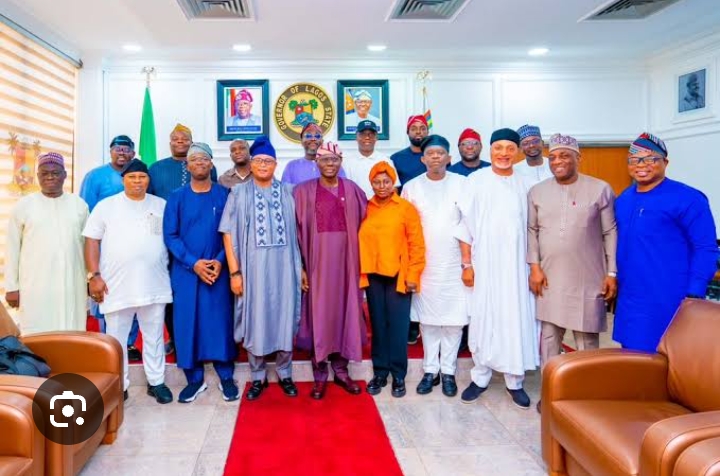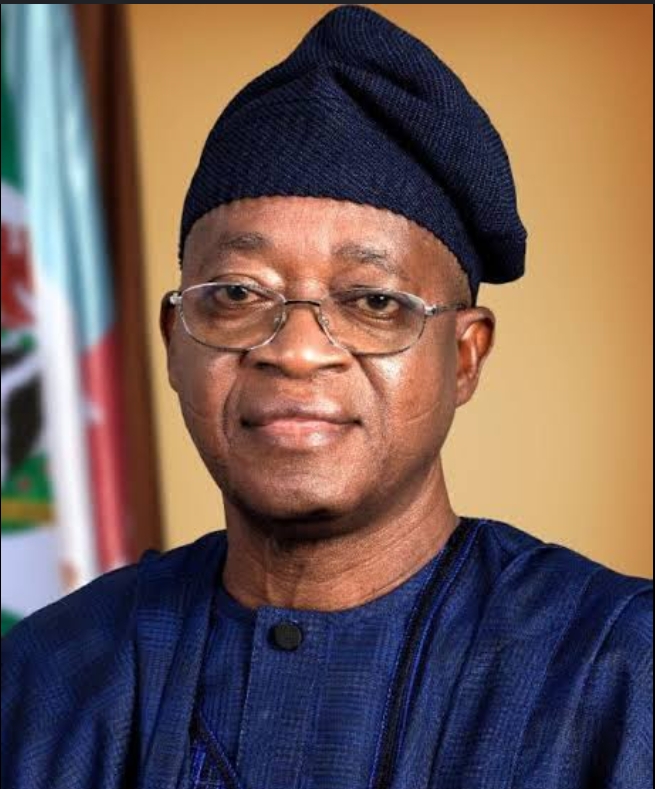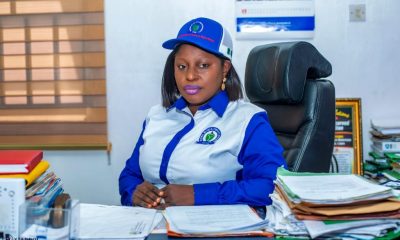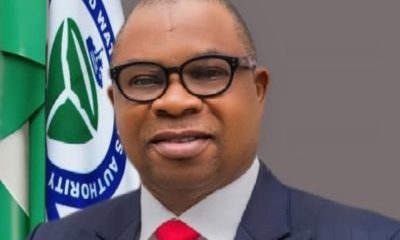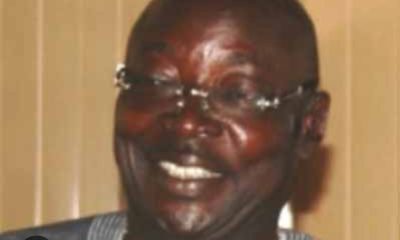Maritime Agencies
BOAT MISHAPS: Training Key To Overcoming the Menace, NIWA Insists
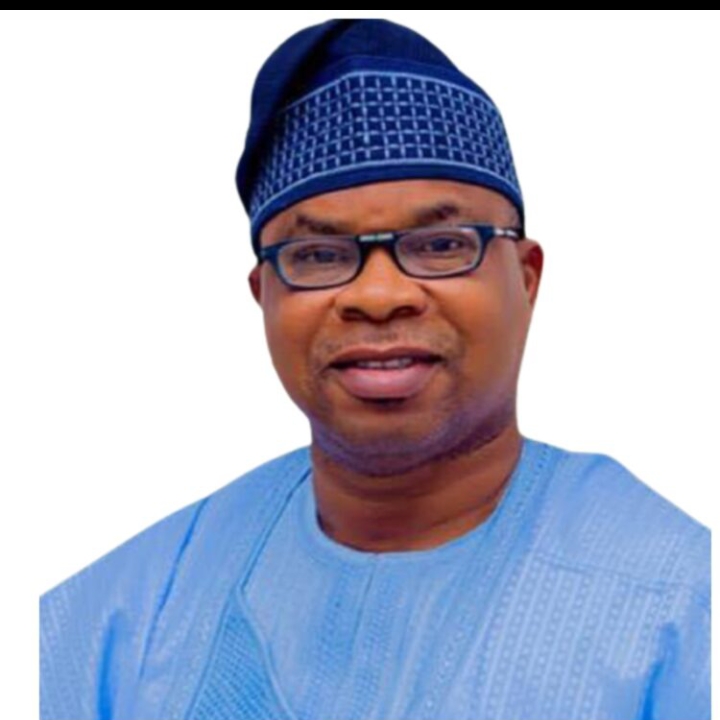
By Izuchukwu Ozoemena
Saturday, March 9, 2024, the Lagos Area Office of the National Inland Waterways Authority (NIWA) mobilized what an industry watcher has described as the highest number, in recent times, of boat captains and deck hands invited to join hands with the waterways regulator to deliberate and fashion out how best to address a nagging matter: frequent boat mishaps. The well-attended gathering was for operators from Zone A comprising Badagry, Tincan and Ijegun area.
It was a no-holds- barred engagement. Boat operators – irrespective of status – were offered unfettered opportunity devoid of any encumbrances to air their views on the issue of safety at sea. Boat drivers and deck hands who ordinarily would feel shy saying the truth in the presence of their bosses and the regulator were encouraged to speak out while their employers were urged to freely accommodate candid views from their subordinates for the sole purpose of achieving safety on the inland waterways, going forward.
In his opening remarks, NIWA Managing Director, Hon Munirudeen Bola Oyebamiji represented by the Manager, Lagos Area Office, Engr (Dr) Sarat Braimah, urged all present to see the day’s engagement as a free thing designed to take a serious look at reasons boat mishaps persist on Lagos waters despite all measures the agency has put in place to curtail or even eradicate it. Have people been failing in roles they play or are supposed to play to curb the menace? What are the problems of captains, deck hands, passengers, government regulators and any other stakeholder? How are these to be realistically tackled to collectively offer a reliable platform to address incidents of boat mishaps in the Lagos area? Are there things the regular is yet to do to solve this nagging issue? Are there fresh ideas and suggestions that can help out?
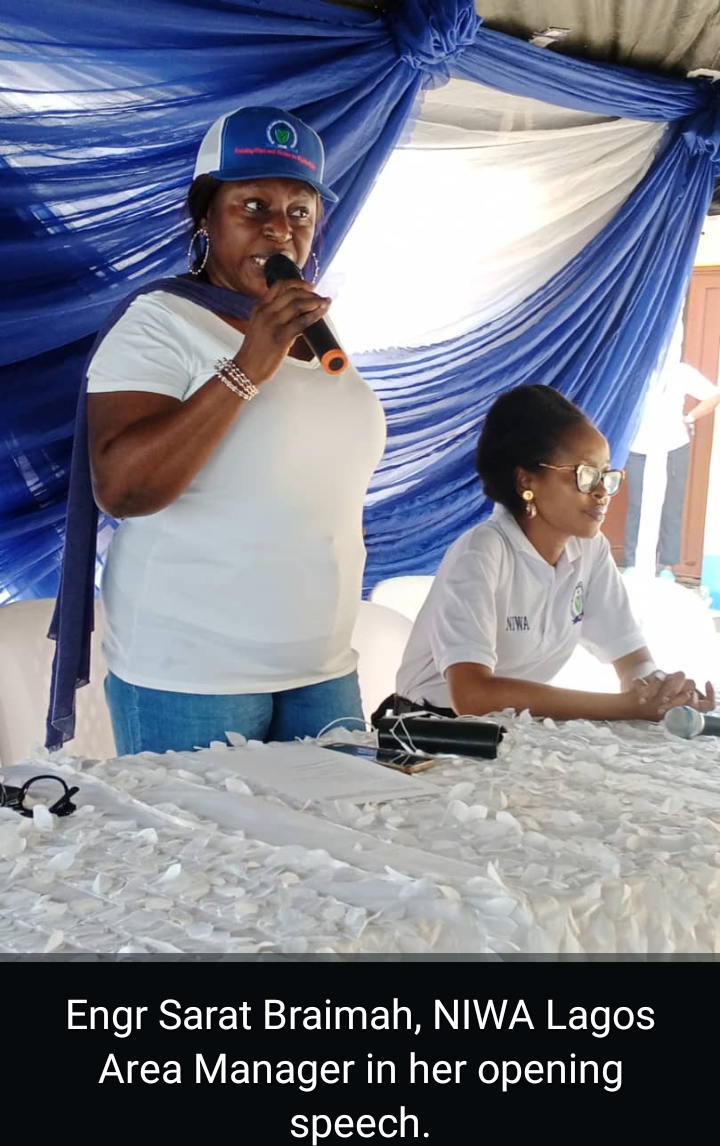
For captains, Engr Braimah reeled out a number of competencies and skills they must not do without. Prominent among these is proficiency in swimming. How many of them can swim during emergencies? She requested those among this group who cannot swim to willingly show up to be trained by NIWA since they are the first line of help to passengers should there be a boat mishap.
“Today is not a day to blame anybody but a time to open up on reasons for frequent boat accidents.”
To her, training for all category of boat handlers remains a constant factor that must never be overlooked because it exposes the trainee to all rudiments, activities and processes he must be familiar with to ensure safety of all on a boat.
Last two incidents in Banana Island, Lagos, she explained, were caused by captains who left the channel and drove to the shore. The second incident occurred because the captain of the boat involved in was struggling with another boat in a speed competition. Speed competition on water? For what purpose?
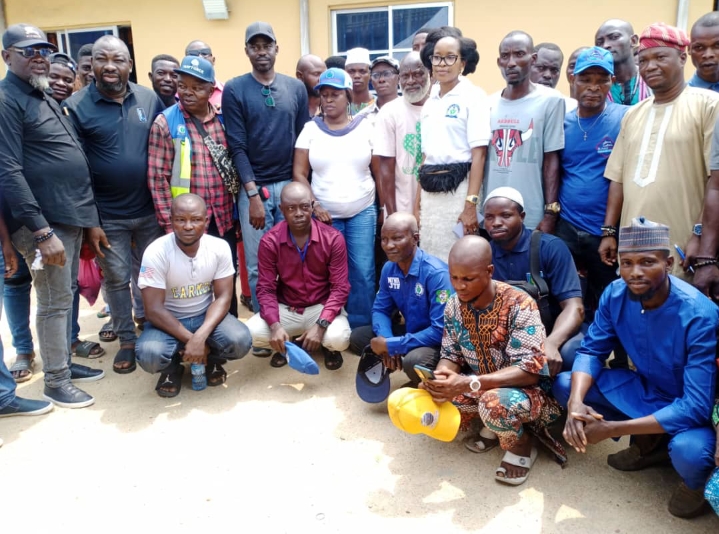
“Training, training, training is compulsory. I know it’s difficult to get money in Nigeria today. But you must suffer yourself and struggle to pay to get training. Please starve yourself to get trained. If you don’t have your boat captain’s licence, you can’t be on the waterways.”
She emphasized that training would have exposed the boat captains to know when and how to move to the shore or the implications of boats competing for speed especially in a marine environment fraught with uncertainties.
Among their complaints, the boat drivers complained of meagre payments that cannot sustain them.
They requested NIWA to reduce the fees for training to enable them afford it. Reacting, Engr Braimah encouraged them to imbibe the habit of saving to raise the money, realizing the implications of not getting trained on their job.
“You can’t sit down in your house and learn”.
Corroborating Engr Braimah’s stand, Saka Stephen, a boat captain, confirmed that training is very important as it offers needed skills in navigation, weather reading, how to mount ropes, among other skills. Training, Stephen emphasized, cannot be compromised.
In his intervention, Comrade Friday Essien appealed to NIWA to streamline the cost of her licence with the one from NIMASA which, he stated, is cheaper.
Prominent among causes of boat mishaps, the operators said, is the physical condition and old age of boats. There are those of fibre, wood and others with holes which continuously battle with uncertainties which include water streaming in during voyage.
There is also the presence of wrecks majorly caused by people who throw all kinds of junks into the water. In most cases, these wrecks are not visible and cannot be sighted by captains and drivers. They appealed that these be identified and promptly removed as boats don’t have what it takes to detect or remove them from the channel.
Exchanging views with the press after the well-attended event, Engr Braimah advised captains and boat drivers to always cool down to know the rights and wrongson the waterways.
We have told them that they should not sail at night.
“Actually, I can say that 80% of night sailing is not in Lagos. We have told them why they should let us have information whenever they see any wrecks on the waterways so that these can be removed immediately. Some of these wrecks are caused by dredgers. We know all dredgers on the inland waterways. We will call to tell them what to do with the wrecks.”
Speaking on boat seaworthiness, she announced that henceforth, NIWA intensify quarterly inspections to ensure boats are seaworthy.
“Before now, all Ikorodu boats have been inspected. The ones qualified for now are allowed to sail; those not qualified will not be allowed until they are refurbished. We are working with the Marine Police.”
Lately, maritime stakeholders have urged the Federal Government to consider offering loans to boat operators from the CVFF to enable them procure new boats and make repayments installmentally.
Aligning with this view, the Area Manager observed that most boats in use now are old even as most boat owners do not have the funds to buy new ones.
“Government has to come in maybe through forming cooperatives, to concretize arrangements so that it will not be easy to evade repayment if such loans are secured. To get a good boat is nothing less than N70K or N80 million, “she explained.
Braimah also reiterated the importance of lifebuoys which 6 or more passengers can hold on to so as to remain stable and avoid panic during an emergency.
To check overspeeding, NIWA has also instructed that speedometers be installed on boats at least for passengers to know when overspeeding is taking place.
Concerning cost of training, splitting the sum into 30 – 30% initial instalment payment and completing it before collecting the certificate gives a trainee a soft landing.
“I believe in training because there’s nothing you can learn or do even in the corridor of your house without experience acquired through training. How do you not have a licence and you want to drive a boat? It’s like being a doctor without going to school. Training is key; that’s what I have been telling the associations that it is better we work together and help ourselves.”
“They can’t be saying that N80,000 is too big for training. It’s not like they’re doing this training every year. It’s for three years. This money is paid once in three years.
NIWA, she stated, has zoned patrols to Ikorodu, Epe and Badagry axis.
“When they know that NIWA patrol is coming, they (boat drivers) will take caution. It’s just like Police being on the road. We have the personnel and that’s why we put ourselves in groups. For instance, in the Lagos Area Office, we’re almost 50 staff plus the Marine Police and the Joint Task Force (JTF).
In his submission earlier, Emmanuel Prowess, a trainer and Licenced Life Guard at Landmark Beach took time to dwell on the importance of life jacket. He urged captains, deck hands and drivers to always check and wear their life jackets while on water.
“Develop the habit of putting your life jacket on before asking passengers to do same. Have excess for passengers and always wash and clean them. To earn the commitment and good conduct of boat drivers, captains and boat owners must provide reasonable incentives to make them happy.”
Concerning boat inspection survey, it is mandatory, the trainer said, that captains inspect and ascertain the readiness of boat engines before navigation. Driving at a cautious speed, he said, enables the boat overcome waves and other natural occurrences.
Passenger loading must not exceed the specific number approved for the boat.
On rescue operation, he said the captain who must possess sound swimming experience should take the lead.
“Knowledge is important. Knowing how to swim places him (the captain) in a position to secure himself and be able to save the passengers.
“When your boat begins to take in water, take it towards the shore. At the jetty, your engine must be on stand-by.
Speed control is very important. An old engine cannot run at its maximum speed: the younger, the faster and better.”
He explained that captains must be conversant with the geography of their areas of operation so as not to infringe on the rights of fishermen and others that maritime laws permit to ply their trade on water. Their fishing nets must not be unduly tampered with. Similarly, dredgers and their equipments have rights that must not be violated.
When approaching a jetty, Emmanuel Prowess counselled, captains must not allow passengers disembark immediately until he secures and anchors the vessel. Before take-off too, all passengers must be secure and settled in the boat. Passenger manifest is a must.
Engr Sarat Braimah implored captains and boat drivers to promptly report to NIWA the presence of wrecks, dredgers, pipes,etc on the channel for necessary action. She distributed dedicated phone numbers for this purpose.
Maritime Agencies
MARAN Hosts Discussion on Nigeria-China Currency Swap Deal: Opportunities, Challenges
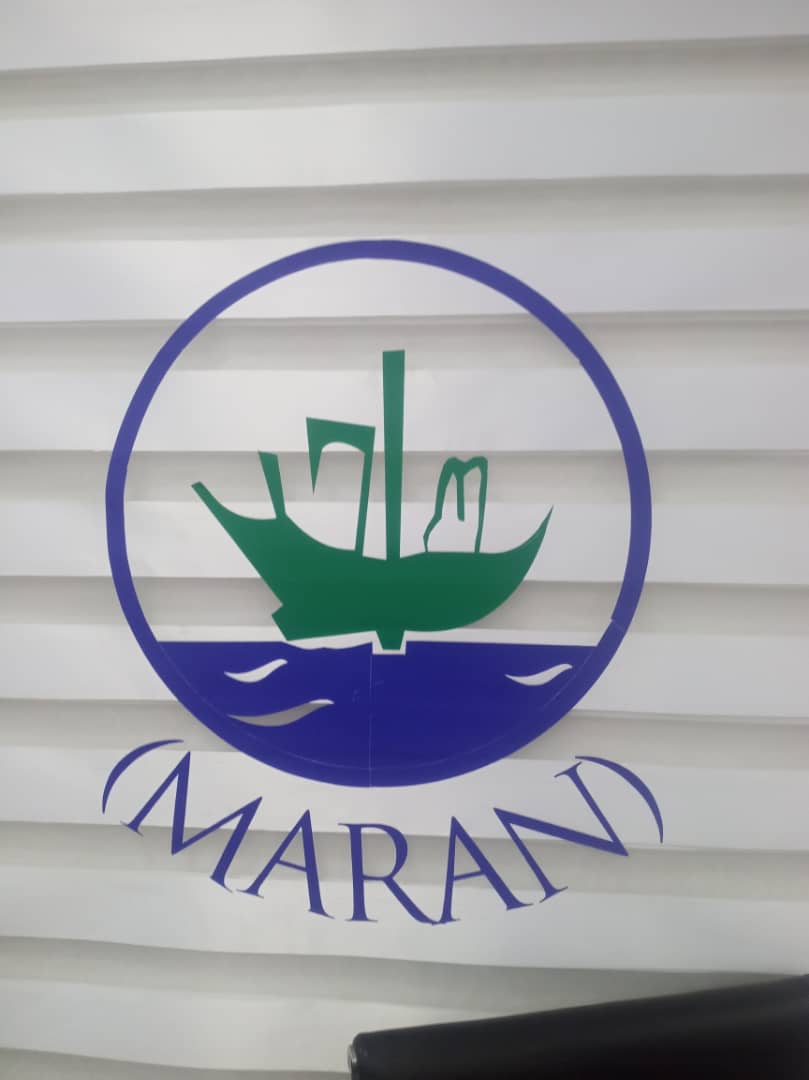
By Izuchukwu Ozoemena
Come April 15, 2025, the Maritime Reporters’ Association of Nigeria (MARAN) will play host to a top- flight event with the theme “Navigating the Nigeria-Peoples Republic Of China Currency Swap: Opportunities and Challenges for Import, Export and Maritime Business”.
The landmark event which takes place a the Rockview Hotel, Apapa GRA, Lagos, will bring together critical stakeholders in the import and export business, policy-makers, and government agencies to examine the Nigeria-China Currency Swap deal and the implications on Nigeria’s maritime industry.
The currency swap agreement, worth 15 billion Yuan ($2 billion), enables the direct exchange of the Chinese Yuan and the Nigerian naira, bypassing the US dollar.
This groundbreaking deal, according to Godfrey Bivbere, President of MARAN, is expected to foster stronger bilateral trade, between Nigeria and China by reducing transaction costs and boosting economic cooperation.
The MARAN President emphasized that in line with her role agenda-setting role, the association recognizes the importance of interrogating the policy further considering the debilitating effect of the American dollar on importation and China’s significant role as Nigeria’s biggest import partner.
Participants expected at the event include the Central Bank of Nigeria (CBN), the Nigeria-China Strategic Partnership (NCSP) and the Chinese Embassy in Nigeria.
Others are the Ministry of Finance, importers, exporters, maritime operators, policy-makers, economists, financial institutions, and trade organizations.
The event aims to provide an enhanced understanding of the Nigeria-Peoples Republic Of China currency swap and its impact on stakeholders in import, export, and maritime businesses.
The meeting will also identify potential risks and opportunities arising from China’s growing economic influence in Nigeria and provide actionable recommendations for stakeholders to navigate changes in the trade and maritime landscape.
Maritime Agencies
Zoe Maritime Breakfast Meeting: NCDMB, NIWA, LASWA Discuss Maritime Logistics, Sustainability of Ocean Economy.
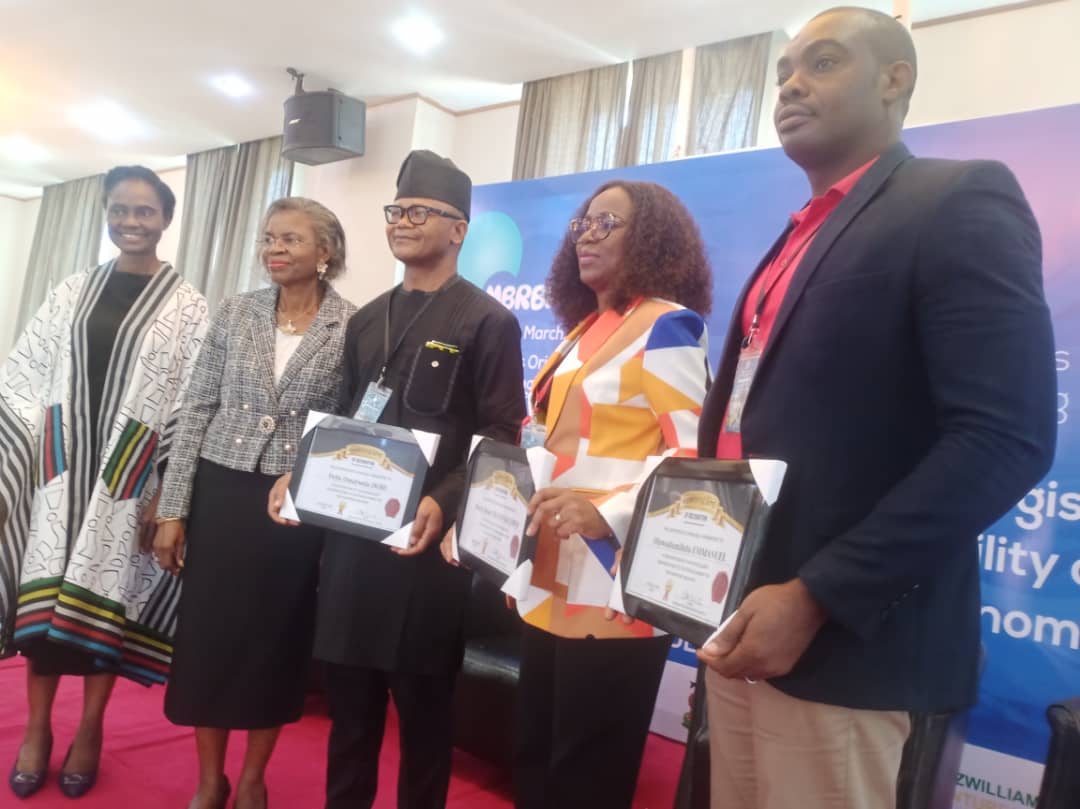
By Izuchukwu Ozoemena
In furtherance of a mandate to champion local human resources input into operations in Nigeria’s oil and gas sectors, the Nigerian Content Development and Monitoring Board (NCDMB) has instituted the Nigerian Content Forum
However, the agency’s intervention in the maritime space has been challenging as she struggles with in-country value addition and pushback in efforts to make progress.
NCDMB Executive Secretary/CEO, Mr Felix Omatsola Ogbe stated this in Lagos, Thursday, during a panel discussion at the 2025 edition of the Maritime Business Roundtable Breakfast Meeting organized by Zoe Maritime Resources Ltd with the theme ‘Maritime Logistics and Sustainability of the Ocean Economy’. Other dignitaries on the discussion included Oluwadamilola Emmanuel, General Manager, Lagos Waterways Authority (LASWA), Engr Elsie Egwuatu, Head of Marine, Lagos Area Office of the National Inland Waterways Authority (NIWA) and Ruth Ikem Chukwukezirim, CEO, Global Energy & Logistics.
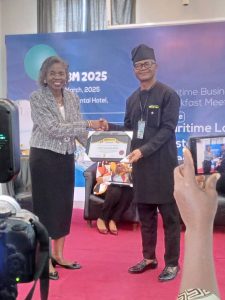
Mr Ajimijaye receiving a souvenir on behalf of NCDMB Executive Secretary/CEO.
Speaking through Silas Omomehin Ajimijaye, General Manager, Research, Statistics and Development, the NCDMB boss referred to the $350 million intervention fund up for grabs by local shipping companies. Not less than 10 Nigerian companies, he explained, have accessed the facility.
“As a matter of fact, before I came here, I was speaking with one of those companies that have benefitted from our intervention. A good example is Starzs Group. They said they are very happy with what NCDMB has done to help them as a as a company. I know the MD, Iro Ogbeifun, a lady who is doing so fantastically well. That is one of those cases we talk about women empowerment. The company is doing well. Not only them, there are several others we are working with to deepen in-country value addition in the maritime sector.”
The fund which keeps growing is disbursed as a single digit loan businesses use and pay back. “This fund is being managed by the Bank of Industry (BOI). Every now and then, they provide a report to show how it is going.”
On collaboration with other agencies, Mr Ajimijaye said part of NCDMB’s mandate is to collaborate with NIMASA to deepen local content through the Nigerian Content plan which should be enshrined into every contract arrangement.
“You have to state what Nigerian Content plan you have now and what you plan to do. Even with manning vessels, you have to show what you have currently and how you want Nigerians to understudy foreigners and possibly integrate them into the system.”
“There is what we call the baseline census for the marine services sector. What this means is that for the companies which are into marine services in the oil and gas sector, we want to do a census, a survey. What is the capacity, the capabilities? How many vessels do they have? Who are the Nigerians there? Who are the foreigners there? What are they doing and what are their challenges? When we analyse the data, we do what we call a gap analysis and have a clear data-driven scenario and recommend to government ways to bridge gaps.”
“We also recognize our partners – NIMASA, NIWA, various other institutions and industry players to collaborate to solve the problems.”
For instance, he explained, what NCDMB calls the Nigerian Content intervention fund is based on a study carried out to realize that people have financial challenges.”
The fund is given to a development bank to help NCDMB administer instead of leaving the money in the Central Bank.
On reducing joblessness among trained seafarers, the NCDMB boss explained that his agency’s intervention is a continuous process.
“For some of them, we do the training and try to source seatime places for them. It is a very big challenge to engage them on vessels for seatime experience. They have the training, certification and exposure. It’s been very fantastic but the problem is the size of the industry. Right now, you can’t take everybody. Entering the programme has always been very competitive. For those who have participated, you can rarely find anyone who has gone through that internship training roaming the streets. It’s only those who have not had the opportunity to have the exposure. The cadet internship training programme is a continuous process. Apart from cadets, we have training for marine surveyors. We give them scholarship. Thereafter, they’re expected to launch out into the world.”
NCDMB recommends that after training, the cadets are not expected to wait for the agency to engage them because it does not have the jobs.
“We are not a maritime company. We’re just to build and launch you to find work anywhere in the world.”
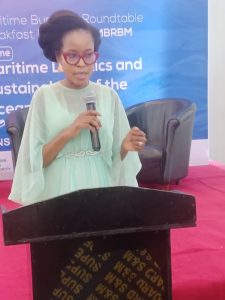
Engr Elsie Egwuatu, Head of Marine, NIWA, Lagos Office.
In a presentation, the National Inland Waterways Authority (NIWA), the statutory regulator of the inland waterways, outlined her critical role in promoting maritime logistics and the sustainability of the ocean economy by making operations on inland waterways safe and seamless. Represented by Engr Elsie Egwuatu, Head of Marine, NIWA, Lagos Office, the
agency dwelt on critical areas of concern currently including maritime accidents and safety, delays, disruptions and navigational challenges which are being tackled headlong with huge assistance from the Minister of Marine and Blue Economy, HE Adegboyega Oyetola.
NIWA, she stated, has also ensured the development of indigenous technical and managerial skills to meet the challenges of modern inland waterways transportation.
In her welcome address earlier, the Chair, Zoe Maritime Resources Ltd, Barr (Mrs) Oritsematosan Edodo-Emore said that as a coastal nation, it is important for Nigeria to harness ocean resources and develop her economy in a manner that sustains her teeming population while eradicating poverty in the land. Maritime logistics, she observed, is an acute driver of the ocean economy.
“In this digital age, it is important to evaluate how logistics is affecting the development of the ocean economy. What are our obligations in maritime logistics? What are the opportunities and how can these be harnessed to uplift the Nigerian populace and, by extension, develop the African continent?”
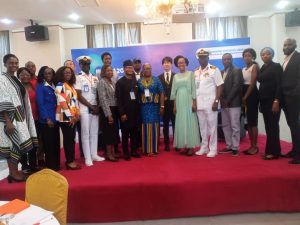
Other participants in the panel discussion included the representative of Oluwadamilola Emmanuel, General Manager, Lagos Waterways Authority (LASWA), the Nigerian Navy and Mrs Ruth Ikem Chukwukezirim, CEO, Global Energy and Logistics.
Maritime Agencies
‘OPERATION WHIRLWIND’: Customs Renews Commitment to Tackling Smuggling, Hauls Largest PMS Seizure in Kebbi.
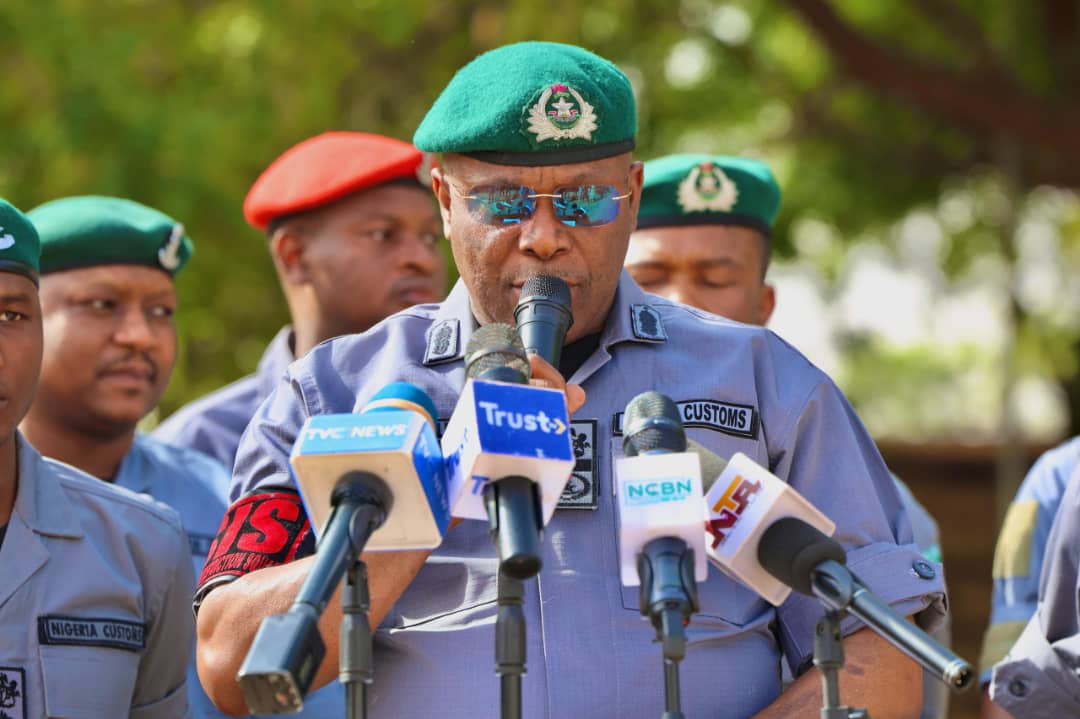
By Izuchukwu Ozoemena
Assistant Comptroller-General of Customs (ACG) Hussein Ejibunu, National Coordinator, ‘Operation Whirlwind’, a special task force of the Nigeria Customs Service on overcoming the menace of petroleum products smuggling, Tuesday, showcased what he described as the largest single seizure of smuggled Premium Motor Spirit (PMS) in Kebbi State since the operation was berthed.
Speaking at Birnin Kebbi, Kebbi State capital, Ejibunu who is also in charge of Financial Administration and Special Duties at the Customs Headquarters said the smuggling of PMS poses a serious threat to the Nigerian economy as it leads to revenue losses, distortion of trade statistics, artificial scarcity, and threats to national security.
The massive seizure, he announced, marks a significant milestone in the efforts of the Nigeria Customs Service (NCS) to protect Nigeria’s critical resources.
“The Nigeria Customs Service remains resolute in tackling smuggling activities that undermine government policies and economic stability,” ACG Ejibunu stated.
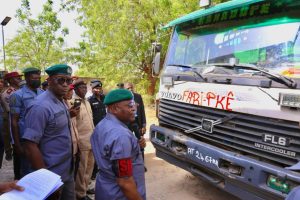
Items seized include 766 jerrycans of 25 litres each and 18 drums of 200 litres each of PMS conveyed in a Truck Plate number DC 7184 RB (Nigeria Plate Number) and 1,454 25-litre jerrycans and 18 200-litre drums of PMS loaded in a Truck number AT 2457 RUP (Republic of Benin plate.
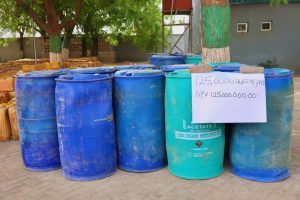
According to him, Truck number BV C240 Arubi—Republic of Benin plate number carrying 1,350 jerrycans, each 25 litres, and 18 drums, each 200 litres of PMS was also confiscated.
Additionally, 805 kegs of 25 litres of PMS seized at various flashpoints in the zone including Dole Kaina, Zaria Kalakala, Tunga Waterside, Lolo, and Tsamiya were also displayed.
The interception, which resulted from credible intelligence, occurred in the Tsamiya area of Kebbi State following days of painstaking surveillance.
Ejibunu who restated the determination of the NCS to sustain the fight against fuel smuggling said the Service is ever prepared to strengthen inter-agency collaboration so as to secure Nigeria’s borders.
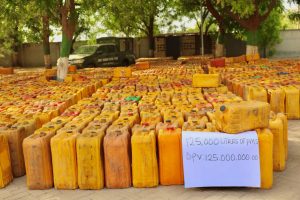
Kegs of confiscated PMS.
The seized PMS was sold at a controlled price of N10,000 per 25-litre jerrican to ensure that citizens rather than the smugglers themselves benefit.
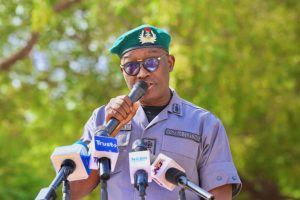
Chidi Nwokorie, CAC, Kebbi Command.
Addressing the press, Comptroller Chidi Nwokorie, the Customs Area Controller (CAC), Kebbi Command, reiterated his commitment to combat smuggling and other illicit trade activities in Kebbi State. He assured stakeholders of the Command’s determination to enforce trade regulations.
“We remain committed to facilitating trade and ensuring a seamless business environment for legitimate traders. For smugglers, our operations will only intensify to bring smuggling to its lowest possible level,” he pledged.
While recognizing how effective intelligence-driven operations can be, CAC Nwokorie commended the efforts of Customs officers in executing successful enforcement operations.
He also acknowledged the collaboration with sister agencies, highlighting their critical role in ongoing anti-smuggling initiatives.
“This success is a testament to the dedication and synergy between Customs and other security agencies. We will continue to work together to protect the nation’s economy,” Nwokorie added.
On his way back from Kebbi, ACG Ejibunu visited the Sokoto Customs Area Command, where he met with the Customs Area Controller, Sokoto-Zamfara Command, Comptroller Umar Abdulkadir and officers and men of the Service.
He used the opportunity to reaffirm the commitment of the Service to border security and the fight against smuggling.
-
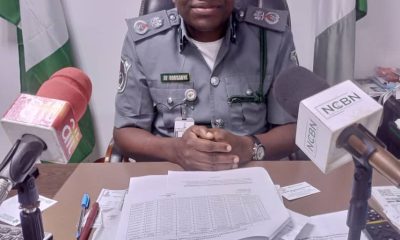
 Maritime Agencies2 weeks ago
Maritime Agencies2 weeks agoLilypond Export Command Is Meeting Expectations, Handles 70% of Nigeria’s Total Tonnage of Export Cargo, says CAC Odusanya.
-

 Personality Interviews3 weeks ago
Personality Interviews3 weeks agoTRADE FACILITATION: FULFIL CUSTOMS REQUIREMENTS, ENJOY AEO, B’ODOGWU, says Ayokunle.
-
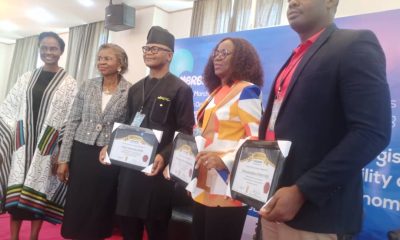
 Maritime Agencies4 days ago
Maritime Agencies4 days agoZoe Maritime Breakfast Meeting: NCDMB, NIWA, LASWA Discuss Maritime Logistics, Sustainability of Ocean Economy.
-
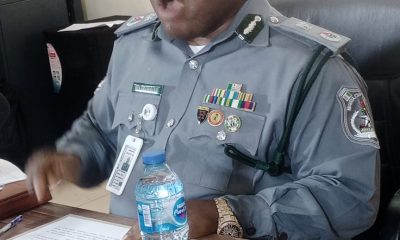
 Maritime Agencies3 weeks ago
Maritime Agencies3 weeks agoSEME CUSTOMS: Dr Oramalugo Dares Smugglers, Seizes N267m Illicit Drugs, PMS, Rice In A Month
-
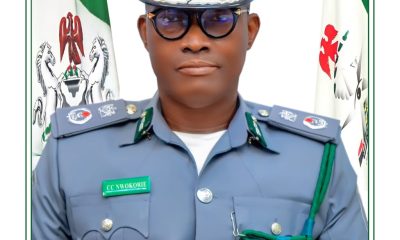
 Maritime Agencies1 week ago
Maritime Agencies1 week agoANTI-SMUGGLING: Kebbi Customs Generates N13.3M In A Month, Confiscates Contrabands Worth N84.2 M.
-
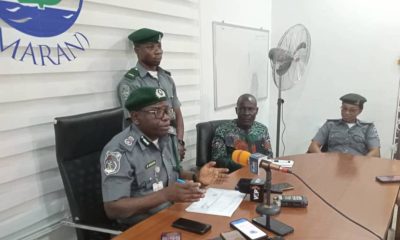
 Maritime Agencies3 weeks ago
Maritime Agencies3 weeks agoCustoms Export Command Seeks Seamless Movement To Ports To Evacuate Export Containers
-
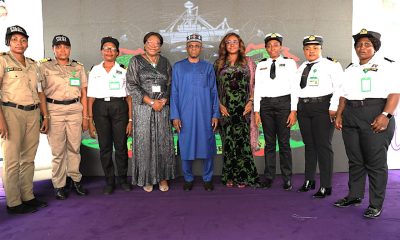
 Maritime Agencies3 weeks ago
Maritime Agencies3 weeks agoINTERNATIONAL WOMEN’S DAY, 2025: NPA Pledges Equal Rights For Women In the Workplace.
-

 Maritime Agencies1 week ago
Maritime Agencies1 week agoPorts Commissioner of Police Commends Bivbere-led MARAN for Responsible Reportage of Maritime Sector


